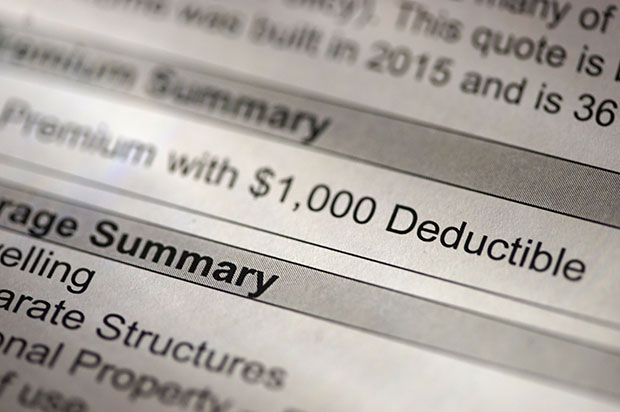Home and Auto Insurance: Understanding and Determining Deductibles
Those of us who own a home, an auto or both in Oswego, Montgomery or Morris (IL) know how important it is to protect our investment with proper insurance. The insurance deductible is an elemental part of a home or auto policy. In this discussion, we’ll examine what a deductible is and how to determine the right one for you.
Your home or auto deductible is how much you will pay when you file a qualifying claim; your insurance will then pay the remainder of the total expense. The deductible is paid with each filing, making it different from health insurance, which covers all costs beyond the deductible minus any co-pays or co-insurance.

The deductible figure is factored as a dollar amount that relates to the insurance premium. A higher deductible usually corresponds with a lower premium, and a lower deductible has a higher premium.
Let’s consider an example involving a home. You have a $1,000 policy deductible (the average amount). A fire causes $5,000 of damage to the kitchen. When you file the claim, you will pay $1,000 for the repair, and the insurer will pay the remaining $4,000.
If your home had sustained less than $1,000 in damage, you would have paid the full amount yourself, and you would not have filed a claim.
(Note that for damage caused by nature such as wind or hail, many policies will calculate the deductible as a percentage, often 1%–5%, of the claim.)
Now let’s say you have an auto policy with a $1,000 deductible. While you’re driving in snow, your car skids into a barrier, causing $3,500 in damage to the vehicle. To repair the car, you will pay the first $1,000 and your carrier will pay the remaining $2,500.
Let’s further review home and auto deductibles separately.
Oswego, Montgomery, Morris (IL) Insurance Deductible: Home
The right homeowners deductible will depend on your financial situation. A good strategy is to carry the highest amount you can afford or that you are comfortable with. The higher deductible will save you more on your premium. Many carriers also may reduce the premium the longer you go into your policy period without making a claim.
If you are financially solvent, whether you pay a low deductible/high premium or a high deductible/low premium may not matter. Your choice may come down to what you can save with lower premiums versus how you measure the chance you’ll need to file claims and pay the deductibles.
If you have modest resources, ideally you have savings or an emergency fund, but if you don’t, you can still gauge by the numbers. If you can pay $1,000 for a claim but $2,000 would be a stretch, the lower amount will be proper for you. You won’t save as much on the premium, but you also won’t have to pay as much at once for a repair.
In the event you can pay for a higher deductible, you can lower your premium, depending on the coverage and the insurer.
Oswego, Montgomery, Morris (IL) Insurance Deductible: Auto
Auto insurance can include different deductibles for different coverage such as collision, comprehensive and uninsured/underinsured motorists. Not all auto coverage requires a deductible. Liability insurance, for example, sometimes does not have one; however, the coverage pays only for the damage you cause others, not for damage to you or your car.
The same principle applies to auto insurance as to home insurance: Carry the highest deductible you can afford should your vehicle be damaged. In addition to lowering your premium, some insurers may offer a “disappearing deductible” program in which your liability amount goes down for each year without a claim.
Deductibles for auto coverage typically range between $500 and $2,000.
Find the Right Coverage and Deductible for You
The Hometowne Insurance team can help guide you through deciding on the desired coverages and deductibles for your auto and homeowners insurance.
Contact us today to find out more about our versatile options for Oswego, Montgomery and Morris.
Oswego/Montgomery: (630) 554-4040
Morris: (815) 942-1312
We are also a main source of home and auto insurance for nearby communities such as Batavia, Geneva, Aurora, Plainfield, Plano and Naperville.
